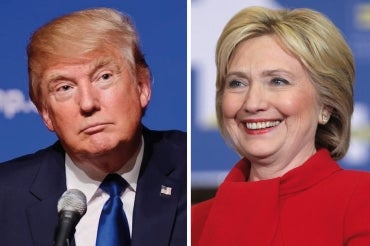Running the numbers: A U of T expert breaks down how political polls dictate voter behaviour

Published: November 3, 2016
With a few days left before the U.S. presidential election, millions are watching the polls, hoping to divine whether Donald Trump or Hillary Clinton will win.
A U of T Mississauga researcher believes polls, in turn, can have an effect on how people vote.
Randy Besco, a post-doctoral researcher with U of T Mississauga's department of political science, looked at how candidates who are behind in the polls are viewed by partisan voters and how that might affect voter behaviour.
 In his 2016 paper “Partisans and a Social Theory of Poll Effects,” Besco found that poll results offer a window into how voters see themselves.
In his 2016 paper “Partisans and a Social Theory of Poll Effects,” Besco found that poll results offer a window into how voters see themselves.
“Supporting a political candidate is a way for people to self-identify,” he says. “As a supporter, the voter takes on the identity of a group of people they feel like they belong to.”
But when a candidate’s popularity is on the wane, it can reflect badly on supporters and change their behaviour, he says.
“People prefer voting for winners. Losing says something bad about the party and by extension, its members and supporters. Nobody likes to identify with a losing group. It says something bad about you.”
One of the factors that can influence behaviour is how much other people know about our political leanings. Showing candidate support with lawn signs, conversations or on social media can become a problem when the candidate starts to slip in the polls, he says.
“We really don’t like it when other people know that we support a loser,” Besco says. “We found that partisans who talk a lot about their vote choice are especially sensitive to the effects of negative polls.”
Besco’s research presented U.S.-study participants with fictional scenarios and asked participants to respond based on political affiliation and scenario-polling results.
Supporting a losing candidate can have several effects on voters, he says.
“It can mobilize them to get out and vote, giving them the feeling that their vote might make a difference. Alternately, they might switch their support to another candidate. If a candidate is very far behind, those same voters might feel that their vote doesn’t really count and decide to stay home.”
“No candidate will predict a solid win, and no candidate wants to be perceived as already having lost the election. That’s why politicians always say it’s a close race,” Besco says. “We know that being too far behind the other candidate – about 15 per cent – will discourage voters from supporting the losing candidate. Voters may feel the race is a lost cause. A smaller gap of about three per cent may motivate engaged voters.
Thanks to Internet technology and mechanical polls, Besco says, it has become very inexpensive to do political polling. He notes that Elections Canada prohibits the publication of new election surveys or opinion polls on election day.
“We see that poll results directly affect voter behaviour and the effects of polling are a lot more important than they ever have been in the past,” he says.



